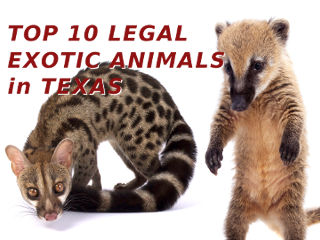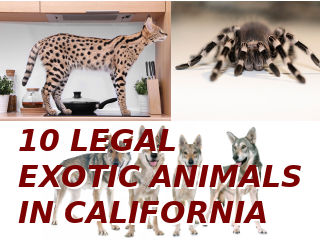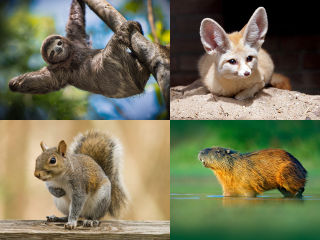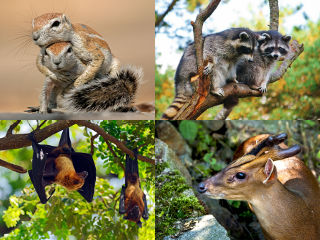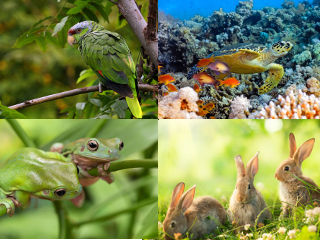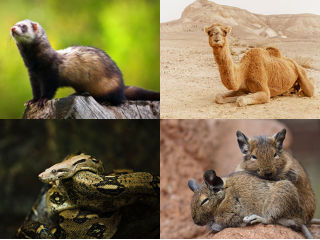Exotic animals can add a unique and interesting element to any household. While most states have strict laws regarding the ownership of exotic animals, Oregon actually has quite a few different exotic animals that are welcome within its borders. Exotic animals in Oregon can include small pocket pets to larger animals, and there is a wide range of exotic species that can be legally kept as pets in this state. It is important to note, however, that while ownership of these animals may be legal, they often require special care and attention. As such, it is important for potential owners to thoroughly research the specific needs of their chosen pet before making the commitment to bring one into their home.
Kinkajou
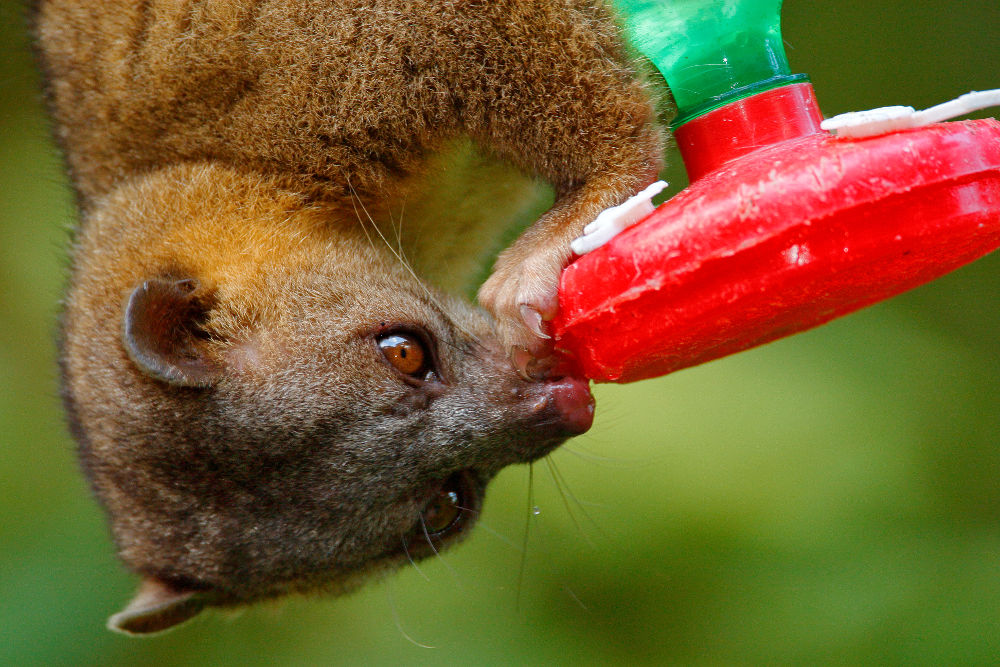
Kinkajous, also known as honey bears or "potoos," are wild animals native to Central and South America. While they may be kept as exotic pets in some areas, it is generally not recommended to keep kinkajous as pets due to their complex care requirements and the fact that they are not domesticated animals.
Kinkajous are nocturnal and arboreal, meaning they are active at night and live in trees. They have long, prehensile tails and are excellent climbers. In the wild, they are primarily fruit eaters, but they also eat insects and nectar. In captivity, they may require a diet that includes a variety of fruits, vegetables, and protein sources. Kinkajous are highly social animals and need the company of their own kind to thrive.
In captivity, they should have at least one companion of the same species and, ideally, a larger group. Kinkajous also need a large, safe, and secure enclosure that allows them to climb and explore. This may include a variety of branches, ropes, and other objects to climb on and play with. Kinkajous can be very active and curious, and they have a strong need to explore and play. As such, they may require a lot of attention and interactive playtime. They can also be prone to boredom and may become destructive if not provided with enough stimulation. Kinkajous also have specific environmental needs that can be difficult to meet in a domestic setting. They need a warm and humid environment, as well as access to natural sunlight or UVB lighting.
Coatimundi
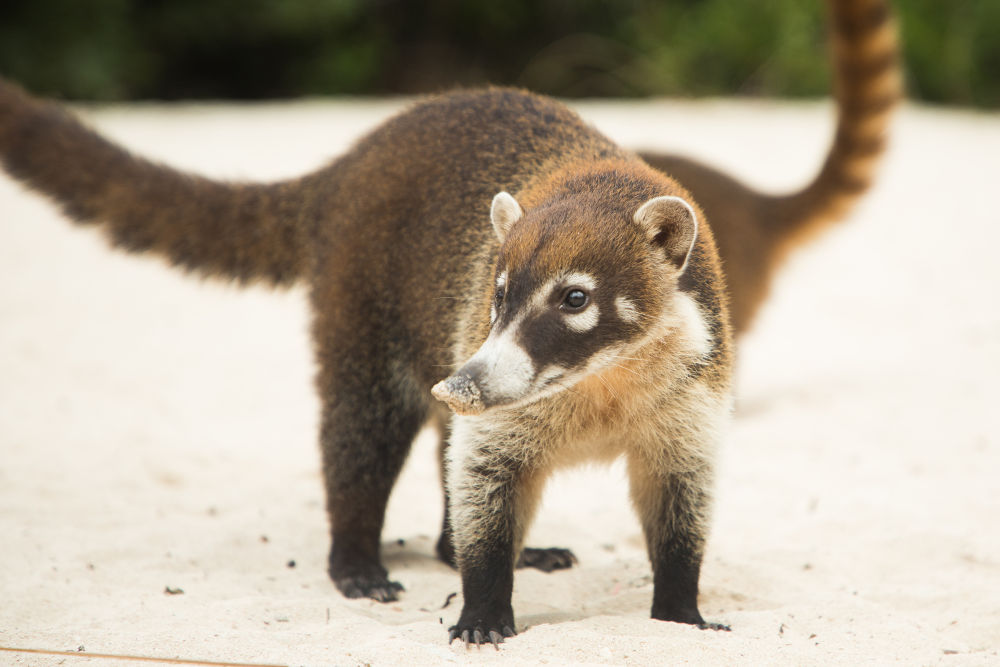
Coatis, also known as Coatimundi or hog-nosed coons, are wild animals native to Central and South America. They are known for their long, pointed snouts and bushy tails, and they are highly agile climbers. Coatis are social animals and need the company of their own kind to thrive. In the wild, they live in groups called bands or troops and have a complex social structure. In captivity, they should have at least one companion of the same species. However, they really thrive in larger groups. Coatis also need a large and secure enclosure that allows them to climb and explore. To ensure they have plenty of enrichment, they'll need various branches and ropes as well as numerous toys to play with. Coatis are omnivorous and need a diet that includes a variety of fruits, vegetables, and protein sources. In the wild, they eat a variety of plants, fruits, insects, and small animals. In captivity, they may require a commercially-available carnivore diet or a diet that includes a variety of fresh fruits, vegetables, and protein sources such as cooked meat or eggs.
It is important to remember that Coatis are a big commitment since, with proper care, they can live for as many as fifteen years. Additionally, while they are quite cute, Coatis do have fangs and sharp claws! And for that reason, they should not be kept around young children. Beyond that, though, these animals can be a great addition to the right household as they can learn tasks like sitting, walking on a leash, and using a litter box. They even get along well with other household pets like cats and dogs!
Short-tailed opossum
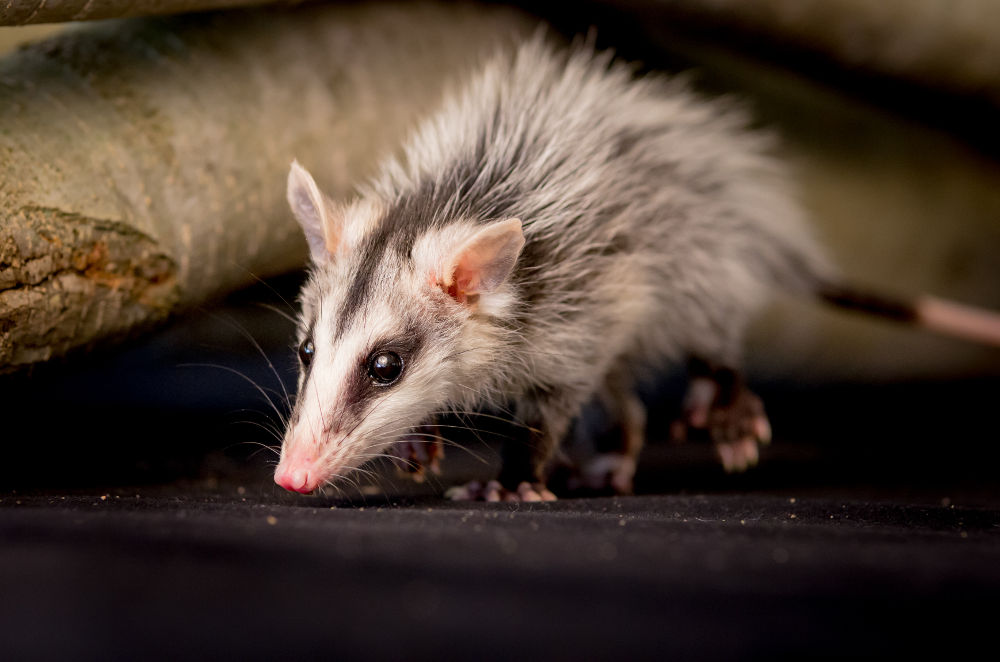
A short-tailed opossum, also sometimes known as a Brazilian opossum or simply a "stoat," is a small marsupial native to South America. They are about the size of a large mouse, with a pointed snout, small ears, and a short, naked tail. Short-tailed opossums have gray or brown fur and are sometimes mistaken for rats due to their small size and pointed snouts. Short-tailed opossums are nocturnal animals, meaning they are active at night and sleep during the day. In the wild, they live in a variety of habitats, including forests, grasslands, and agricultural areas. They are omnivorous and eat a variety of plants, fruits, insects, and small animals. They require a daily protein content of at least 30% protein.
While they are quite tiny animals, they do require a significantly larger habitat than many people might originally expect. The minimum requirement for a short-tailed opossum's habitat is a 20-gallon vivarium or tank. But bigger is better as they need lots of room to exercise and play! These little animals are typically described as solitary animals and do best without a companion. That being said, though, they still do need plenty of ways to stimulate and enrich their lives. An exercise wheel will be an absolute must. They also benefit from furnishings like hammocks, tunnels, pouches, and various kinds of hides. While not entirely common, they are slowly becoming more popular as a pet thanks to their curious, playful, and friendly nature. The fact that they like to keep themselves clean and have a low odor is another big plus!
Cassowary
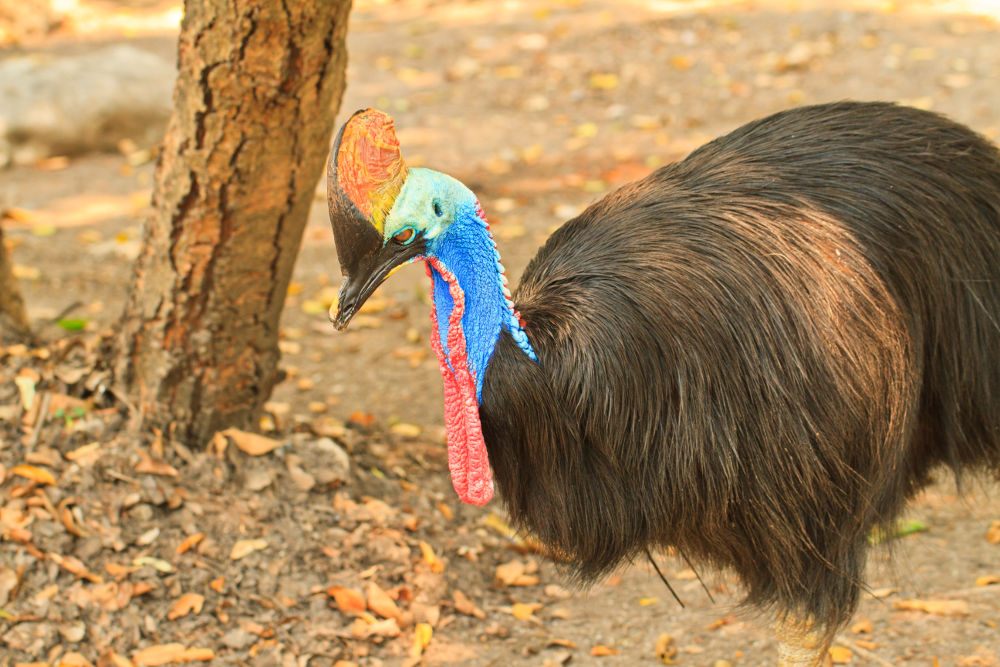
A cassowary is a large, flightless bird native to the tropical rainforests of New Guinea and northeastern Australia. There are three species of cassowaries: the southern cassowary, the dwarf cassowary, and the northern cassowary. The southern cassowary is the largest and most well-known species, with males reaching up to 6 feet (1.8 meters) in height and weighing up to 150 pounds (68 kilograms). Cassowaries are known for their distinctive appearance, with a bright blue and red neck and a large casque (helmet-like structure) on their head. They have long, strong legs and sharp claws on their toes, which they use for defense and for scratching at the ground to find food. Cassowaries are mainly herbivorous and feed on a variety of fruits, seeds, and small animals. They are shy and elusive animals and are generally not found in areas with high human activity.
Cassowaries are not domesticated animals and are not typically kept as pets. They have specific care requirements and are best observed and appreciated in their natural habitat. It is illegal to keep cassowaries as pets in some areas. If you are interested in learning more about cassowaries, it is a good idea to visit a reputable sanctuary or observe them in their natural habitat.
Guinea pigs
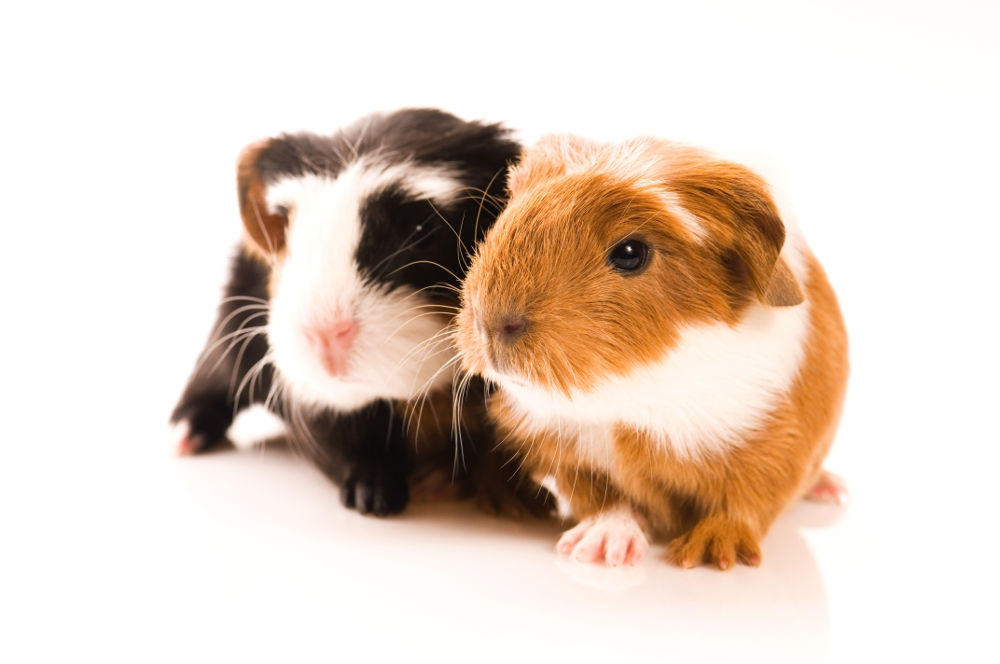
Guinea pigs are herbivorous animals and need a diet that includes a variety of fresh vegetables and hay. It is important to feed them a varied diet in order to ensure that they receive all of the nutrients they need to stay healthy. Some good vegetables to include in a guinea pig's diet are:
- • Dark, leafy greens such as kale, spinach, and parsley
- • Root vegetables such as carrots, bell peppers, and sweet potatoes
- • Cruciferous vegetables such as broccoli, cauliflower, and cabbage (in small amounts)
- • Legumes such as peas and beans
It is important to introduce new foods gradually and in small amounts to allow guinea pigs to adjust to them. It is also important to avoid feeding them foods that are high in sugar or starch, as these can cause digestive problems.
In addition to vegetables, guinea pigs also need a constant supply of fresh hay to chew on. Hay helps to keep their teeth trimmed and provides them with the necessary fiber. There are several types of hay available, including timothy hay, oat hay, and alfalfa hay. Guinea pigs also need a source of vitamin C, as they are unable to produce this essential nutrient on their own. They can get vitamin C from fresh vegetables or from a vitamin C supplement. It is important to provide them with a consistent source of vitamin C to prevent deficiencies.
Many people really enjoy having guinea pigs as pets for many reasons. Relatively speaking, they are easy to care for as they don't need exercise and activity in the same structured manner that other pets like dogs do. They are also highly social animals, both with each other and with their humans. Guinea pigs are often a great choice for children so long as a parent is the pig's primary caregiver and teaches children how to gently handle the pigs.
Sugar gliders
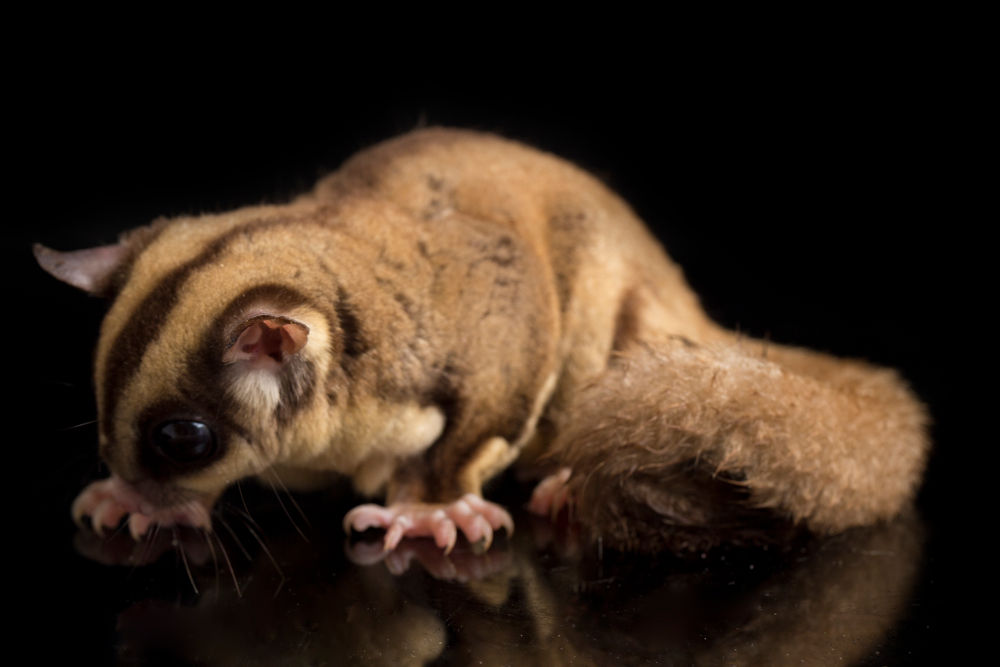
Sugar gliders are small marsupial animals native to Australia and New Guinea. They are known for their ability to glide through the air using a membrane called a patagium that stretches between their front and hind legs. Sugar gliders are omnivorous and eat plants, fruits, insects, nectar, and sap, and they will sometimes eat animals like small birds or rodents. Sugar gliders are highly social animals and need to be kept in pairs. They usually do best in a pair of one male and one female.
One of the things to be wary of when keeping a sugar glider as a pet is that they can easily become stressed. Being kept in too small of habitats, not getting enough exercise, eating a poor diet, and being woken up excessively during the daytime hours can all be detrimental to their health. In fact, when not properly cared for, they are known to suffer from self-mutilation, where they will scratch at and bite at their own skin and fur. Another thing to keep in mind is that they can easily develop dental disease if you let them give in to their sweet tooth too often. When properly cared for, sugar gliders can live a healthy, happy life in captivity for about ten to fifteen years.
Dwarf hamsters
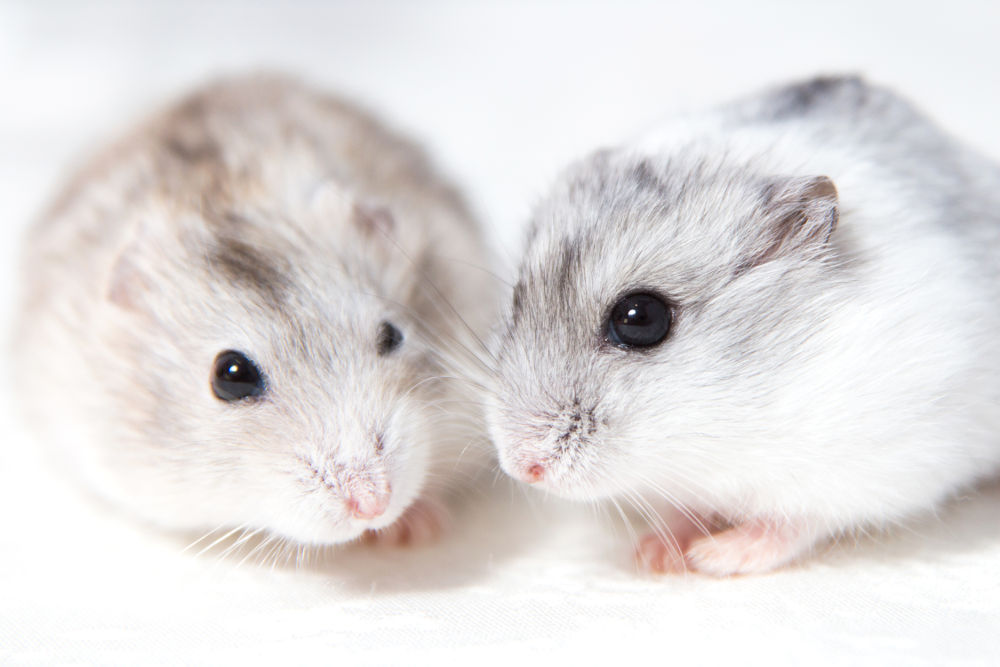
Dwarf hamsters are small, adorable pets that are popular with people of all ages. There are several species of dwarf hamsters, including Russian dwarf hamsters, Chinese dwarf hamsters, and Roborovski dwarf hamsters. Dwarf hamsters are generally smaller than other species of hamsters, with adults weighing between 1.5 and 4 ounces (45 and 113 grams). Dwarf hamsters are active and playful animals that need plenty of space to play and explore. They should be kept in a large cage or enclosure with plenty of toys, such as tunnels, balls, and climbing structures. It is important to provide them with a variety of items to keep them entertained and prevent boredom.
Dwarf hamsters are nocturnal animals and are most active at night. They are also prone to becoming overweight, so it is important to monitor their food intake and make sure they are getting enough exercise. Dwarf hamsters should be fed a diet of commercial hamster food supplemented with small amounts of fresh fruits and vegetables. They also need a constant supply of fresh water.
Dwarf hamsters are generally gentle and easy to handle, but it is important to handle them gently and to supervise young children when they are interacting with the hamster. Dwarf hamsters are prone to biting if they feel threatened, so it is important to approach them slowly and calmly.
Skinks
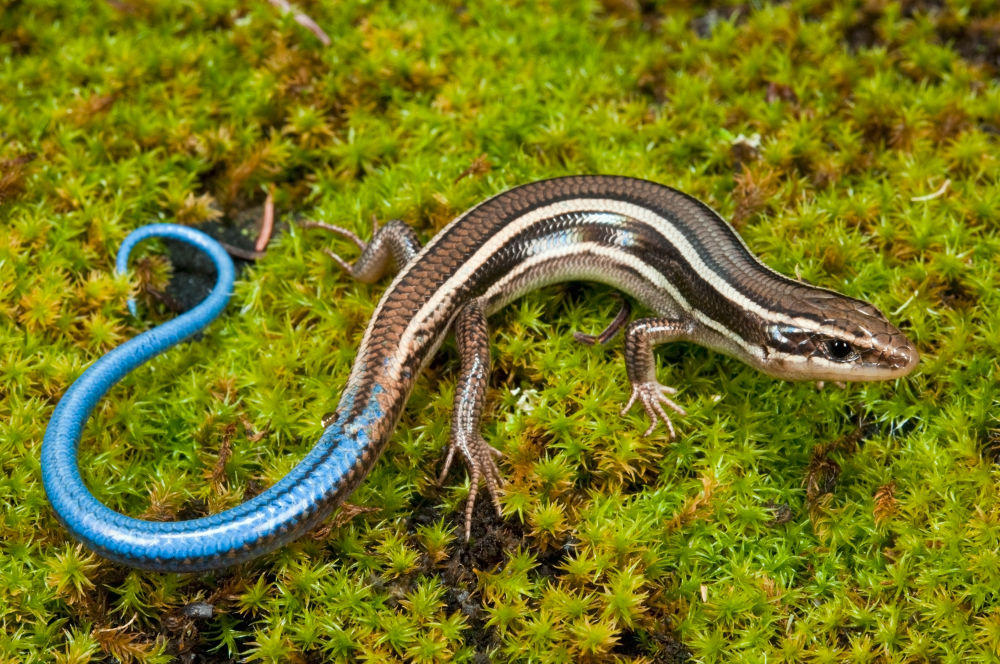
Skinks are a type of reptile that belongs to the family Scincidae. There are over 1,500 species of skinks, and they are found on every continent except Antarctica. Skinks are generally small to medium-sized lizards with long, slender bodies and short legs. Skinks are generally active and energetic animals that require a large enclosure with plenty of room to move and explore. They need a basking area with a heat source, such as a basking lamp, and a hide box or shelter where they can retreat to when they feel threatened or need to rest. Skinks also require a consistent temperature and humidity level in their enclosure.
Skinks are carnivorous animals and need a diet that consists mainly of insects, such as crickets, mealworms, and roaches. Some species of skinks may also benefit from being fed small amounts of fruits and vegetables. It is important to feed skinks a varied diet in order to provide them with all of the nutrients they need to stay healthy. Skinks are a type of reptile that require specific care in order to thrive. Some of the things that a pet skink will need include:
- 1. A large enclosure: Skinks are active and energetic animals that need plenty of room to move and explore. A large enclosure with plenty of hiding spots and climbing structures is important to provide them with a suitable environment.
- 2. A heat source: Skinks are cold-blooded animals and need a heat source to regulate their body temperature. A basking lamp or heat pad can provide the necessary heat.
- 3. A hide box or shelter: Skinks need a place to retreat to when they feel threatened or need to rest. A hide box or shelter can provide them with a secure place to hide.
- 4. A consistent temperature and humidity level: Skinks require a consistent temperature and humidity level in their enclosure to stay healthy. It is important to monitor these levels and make any necessary adjustments.
- 5. A varied diet: Skinks are carnivorous animals and need a diet that consists mainly of insects, such as crickets, mealworms, and roaches. Some species of skinks may also benefit from being fed small amounts of fruits and vegetables.
Toucans
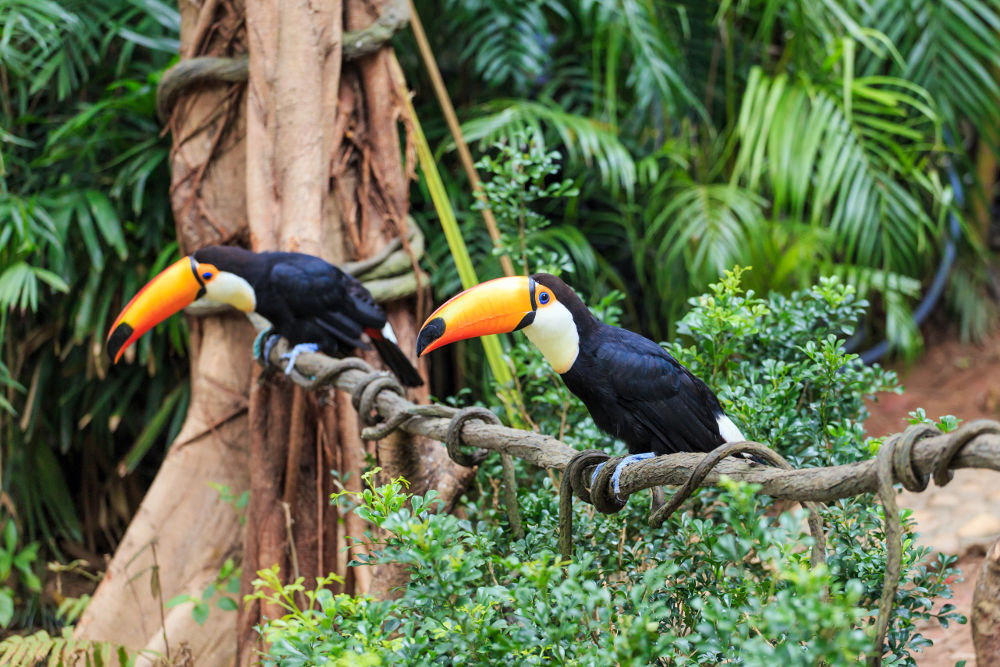
Toucans are large, brightly colored birds native to Central and South America. While they may be appealing due to their distinctive appearance and colorful beaks, they are not suitable pets due to their specific care requirements and the challenges involved in meeting those requirements in a domestic setting.
Toucans are tropical birds that require a consistent temperature and humidity level in their environment. They also need a large enclosure with plenty of room to fly and climb, as well as a variety of toys and other items to keep them entertained and prevent boredom. Toucans are intelligent and social birds and may benefit from being kept with a companion of the same species. Toucans are omnivorous and need a varied diet that includes a variety of fresh fruits, vegetables, and protein sources, such as cooked meat and eggs. They also need a constant supply of clean water.
One of the benefits of toucans as a pet is that they can be quite playful and affectionate. Some owners even describe them as being cuddly! Additionally, they are not known for the screeching, yelling, or screaming behaviors that some other exotic birds are known to exhibit, making them a great pet for the bird aficionado who might like a little bit more peace and quiet in their home. Additionally, their famously oversized beaks are actually quite weak, so in the rare circumstance that a toucan would bite someone, it likely won't hurt very badly and won't do very much damage in contrast with other popular exotic pet birds.
Porcupines
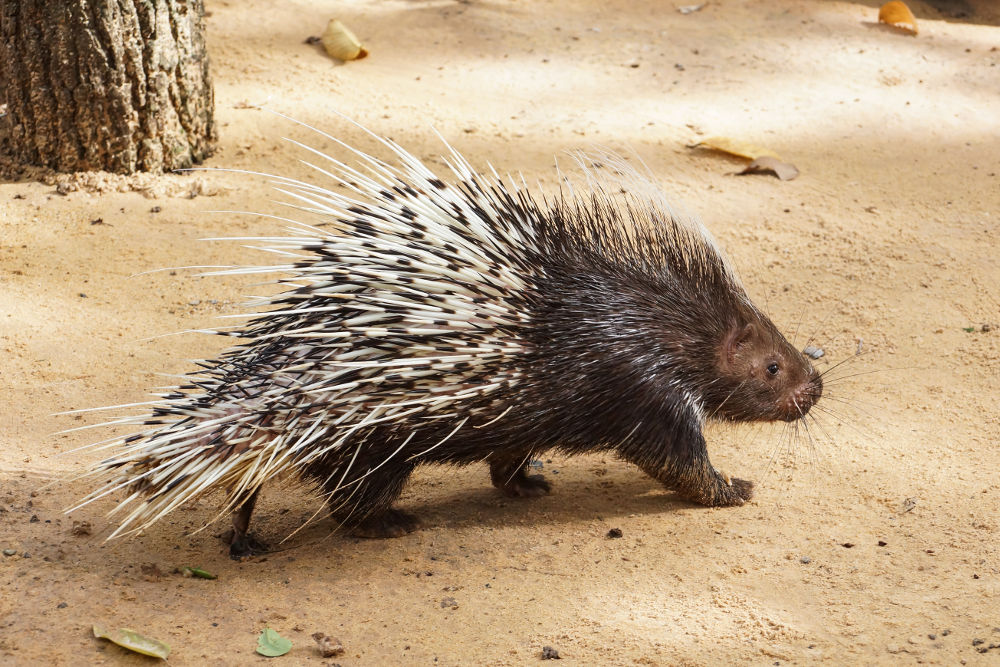
Porcupines are large, spiny rodents that are native to North and South America, Africa, and parts of Asia. They are not typically kept as pets due to the challenges and responsibilities involved in caring for them. Porcupines have specific care requirements that may be difficult to meet in a domestic setting, and they are not domesticated animals.
Porcupines are known for their sharp quills, which they use for defense against predators. They have a coat of sharp, stiff hairs called quills that cover their body and can be raised or lowered depending on the porcupine's level of aggression or fear. Porcupines are generally docile animals, but they can become aggressive if they feel threatened or are handled improperly. Porcupines are herbivorous and need a diet that consists mainly of plant matter, such as grasses, leaves, twigs, and bark. In the wild, they also eat fruits, nuts, and seeds. In captivity, porcupines may require a diet that includes a variety of fresh vegetables, hay, and a limited amount of commercial porcupine feed.
Porcupines are generally solitary animals and do not require a lot of social interaction. They need a large, secure enclosure with plenty of room to move and explore. They also need a hiding spot or shelter where they can retreat to when they feel threatened or need to rest.
Things to remember
When adopting an exotic animal, there are a few things to take into consideration. First, check local laws and regulations to ensure that it is legal to own the specific type of exotic pet you are considering. Some states have restrictions on certain species or require special licenses or permits. While on a state level, these animals may be legal to own, sometimes different cities, townships, counties, etc., have their own rules on such matters. Secondly, you'll need to consider the high level of care and maintenance requirements of the exotic pet you are considering. This will include factors such as diet, housing, exercise, and veterinary care.
Consider whether you have the necessary expertise to care for the exotic pet or whether you will need to seek out the help of a professional. Be aware of the potential lifespan of the exotic pet you are considering and whether you are prepared to commit to caring for it for that length of time. Last but not least, consider the potential financial costs of owning an exotic pet, including the initial purchase price, ongoing care, and maintenance expenses, and any necessary veterinary treatment.
Conclusion
Owning an exotic animal can be a highly rewarding experience for many people. If you live in Oregon, this list is a great place to start in your search for legal exotic animals. As previously mentioned, remember to do plenty of research to ensure that the animal you are interested in is the right fit for you, your family, and your lifestyle, and be sure to check with local governments about the legality of owning said animal. Once you put in the work, many of these animals can be an amazing addition to your life!
FAQ
What does a kinkajou eat?
A kinkajou (Potos flavus) is a nocturnal mammal native to the tropical forests of Central and South America. Their diet primarily consists of fruits, making them frugivorous animals. They particularly enjoy ripe and sweet fruits like bananas, mangoes, and grapes. In addition to fruits, kinkajous may also eat insects, small vertebrates, and occasionally nectar and honey from flowers. They have a long, prehensile tail that helps them navigate through the trees, and a long tongue that aids in extracting nectar from flowers.
How long does a kinkajou live?
Kinkajous have a relatively long lifespan for mammals of their size. In the wild, they typically live for around 20 to 25 years, though their lifespan can vary depending on factors like predation, disease, and habitat quality. In captivity, kinkajous can live longer, with some individuals reaching 30 years or more, given appropriate care and a suitable environment.
Can coatimundi be pets?
Coatimundis, or coatis (Nasua nasua and Nasua narica), are medium-sized mammals native to Central and South America. Although some people have kept them as pets, they are not considered ideal domestic animals for a few reasons: Behavior: Coatis are intelligent and curious animals but can also be aggressive, particularly when they reach sexual maturity. They have sharp teeth and claws, and their bites can be painful and even dangerous. Social needs: In the wild, coatis live in social groups called bands. When kept in isolation, they may suffer from loneliness, stress, or boredom, which can lead to behavioral problems. Activity level: Coatis are energetic, agile animals that require plenty of space and physical activity. They also have a strong instinct to dig and climb, which can be difficult to accommodate in a typical household. Diet: Coatis are omnivores and require a varied diet that includes fruits, vegetables, insects, and small animals. Providing a proper diet in captivity can be challenging. Legal restrictions: In some jurisdictions, keeping coatis as pets may be illegal or require special permits. Zoonotic diseases: Coatis can carry diseases that can be transmitted to humans, such as rabies, making them a potential risk to their owners and others.

